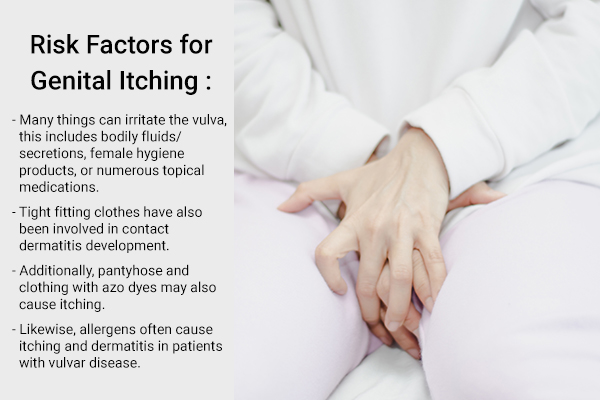In this article:
Private parts are extremely delicate areas of your body, and itching (pruritus) in these sensitive areas such as the vagina and vulva can be very awkward and uneasy. It can steer the person to discomfort because of the persistent desire to itch.

Itching in the private parts is more prevalent in women, especially in the vulva (the vulva is the outer part of the female genitals, including the lips, clitoris, bladder opening, and vaginal opening). This is called vulvar pruritus, which is a frequent, chronic, and uncomfortable symptom associated with numerous vulvar disorders.
The precise prevalence of pruritus is unidentified as available data are very limited. The prevalence of genital itching may also be tricky to evaluate as it is vastly under-reported because of the embarrassment many women feel when talking about genital symptoms.
But one thing is for sure – genital or vulvar pruritus can have a huge effect on the quality of life. (1)
In this article, learn a bit more about pruritus. What are its causes? How to prevent it? And most importantly, when to see a doctor?
Causes of Vulvar Pruritus
Itching in the private parts is a distasteful feeling and a frequent symptom associated with many dermatological diseases, including: (2)
- Atopic dermatitis
- Irritant contact dermatitis
- Allergic contact dermatitis
- Psoriasis
- Seborrheic dermatitis
- Yeast infections
- Bacterial infections
- Vaginitis
- Lichen sclerosis (a skin disorder causing thin, white patches on the genitals)
- Lichen planus (an inflammatory condition that can affect the skin, mouth, or nails)
Risk Factors for Genital Itching
Risk factors for genital itching include:

- Many things can irritate the vulva. These include bodily fluids/secretions, female hygiene products, and some topical medications.
- Tight-fitting clothes have also been involved in the development of contact dermatitis.
- Pantyhose and clothing with azo dyes may also cause itching.
- Allergens often cause itching and dermatitis in patients with vulvar disease. Typical allergens include fragrances and preservatives in toiletries, cleansing wipes, antiseptics, spermicides, sanitary pads, and lubricants.
- Topical medicines such as steroids, anesthetics, and antibacterial and antifungal agents may also contribute to itching. (1)
How Is Genital pH Linked to Pruritus?
The pH of the vulva and vagina is high in preadolescence, but during puberty, the pH reduces from an average of 7 to reach 4 in adulthood. This is when lactobacilli begin to inhabit the vulvovaginal area.
During a woman’s hormonal cycle, there is an ongoing change in the bacterial flora. Also, the pH levels change and ultimately cause pruritus. This is because an increase in pH may trigger the proteinase-activated receptor-2 (PAR-2), which is a prominent itch mediator. (3)
When to See a Doctor
Some cases of genital itching can go away on their own or can be managed at home, but if the itch gets worse or lasts for a long time, you should be assessed by your healthcare provider.
If your symptoms are not mild, you’re not seeing any improvement, or the itching is affecting your quality of life, seek medical help.
While an itchy vagina can usually be managed using home remedies, you may need to visit a physician if you experience these symptoms:
- Pain during sex or urination
- Pain in the genital area
- Genital redness
- Swelling
- Blisters
- Unusual vaginal discharge
- Itching after having sex with a new partner
Final Word
You don’t have to live with itchy private parts. Treatment options are available to alleviate or even eradicate your symptoms.
See your healthcare professional for assistance, and be sure to take the necessary steps and medicines as advised by the doctor. Don’t let itchy genitals hinder your quality of life!
 Continue Reading8 Home Remedies for Itching in Private Parts for Females
Continue Reading8 Home Remedies for Itching in Private Parts for Females
- Was this article helpful?
- YES, THANKS!NOT REALLY


